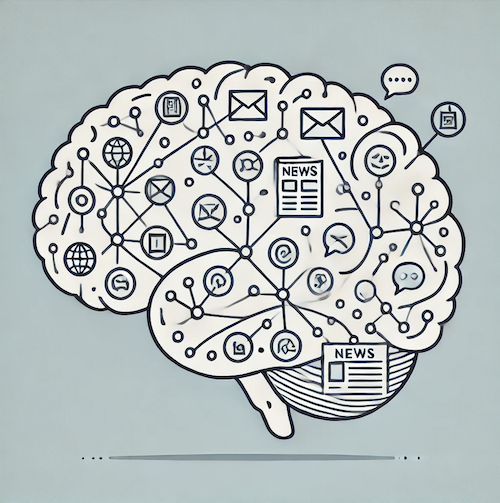News & Learning

We live in an era where information is overloaded and attention is scarce. Since most news sources (social media or news apps) need to get our attention to make money, they often rely on recommendation systems, which analyze our past behaviors to suggest new content, to curate engaging content to keep us on their platform (Oeldorf-Hirsch 2018). However, this ecosystem has problems. For one, people are spending more time reading the news but are learning less (van Erkel et al. 2021). Also, it has also made people more susceptible to fake news. Together, they deteriorate our public discourse and erode trust in society.
Recently, researchers responded to this challenge by refocusing recommendation systems from user engagement to content fairness, bias-awareness, and more (e.g., Deldjoo et al. 2023). Yet, much of this research emphasizes the content within news articles, neglecting the knowledge users bring to the table (Qi el al. 2021). Insights from learning science made clear the importance of building upon existing knowledge for efficient learning (Vygotsky et al. 1978).
In this project, we aim to apply learning science principles to enhance how people learn from the news. Our approach focuses on two key goals: making valuable, diverse information easier to access and reducing susceptibility to misinformation. Specifically, we plan to develop systems that assess users’ existing knowledge, identify gaps or overlooked perspectives, and recommend news articles to bridge those gaps. By doing so, we aim to make news consumption more efficient and less influenced by engagement-driven algorithms.
References
- Deldjoo, Y., Jannach, D., Bellogin, A., Difonzo, A., & Zanzonelli, D. (2023). Fairness in recommender systems: Research landscape and future directions. User Modeling and User-Adapted Interaction. https://doi.org/10.1007/s11257-023-09364-z
- Oeldorf-Hirsch, A. (2018). The Role of Engagement in Learning From Active and Incidental News Exposure on Social Media. Mass Communication and Society, 21(2), 225–247. https://doi.org/10.1080/15205436.2017.1384022
- Qi, T., Wu, F., Wu, C., & Huang, Y. (2021). Personalized News Recommendation with Knowledge-aware Interactive Matching. Proceedings of the 44th International ACM SIGIR Conference on Research and Development in Information Retrieval, 61–70. https://doi.org/10.1145/3404835.3462861
- van Erkel, P. F. A., & Van Aelst, P. (2021). Why Don’t We Learn from Social Media? Studying Effects of and Mechanisms behind Social Media News Use on General Surveillance Political Knowledge. Political Communication, 38(4), 407–425. https://doi.org/10.1080/10584609.2020.1784328
- Vygotsky, L. S., & Cole, M. (1978). Mind in Society: Development of Higher Psychological Processes. Harvard University Press.